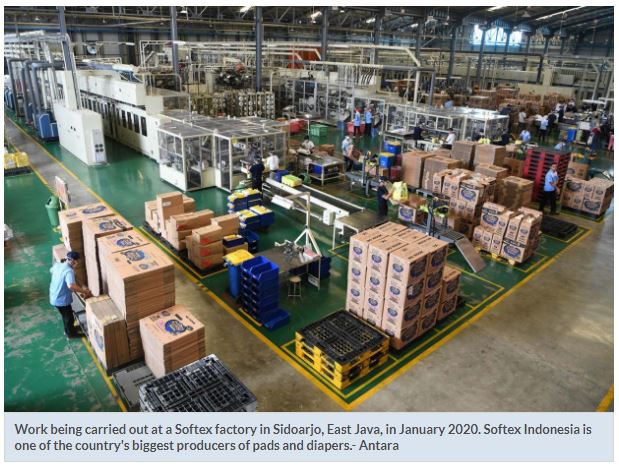Indonesia’s factory activity slows in February
JAKARTA (The Jakarta Post/ANN): Indonesia’s manufacturing growth slowed down in February after hitting a six-year high the previous month as flooding and the Covid-19 pandemic disrupted the sector.
The country’s Purchasing Managers’ Index (PMI) dropped to 50.9 in February from 52.2 in the previous month, business information provider IHS Markit reported on Monday (March 1).
The index, a gauge of the sector based on a monthly survey of roughly 400 manufacturers, still stood above the 50-point threshold and thus signalled a sustained expansionary trend that began in November.
A reading below the threshold suggests a contraction from the previous month.
“Recent elevated Covid-19 case numbers show that the pandemic continues to disrupt operations, ” IHS Markit economics director Andrew Harker was quoted as saying in a press release issued Monday.
“That said, the manufacturing sector remained relatively resilient in February, merely seeing a slowdown in growth rather than any outright contraction in output and new orders.”
While the number of new confirmed daily coronavirus cases actually dropped to 6,808 on Wednesday, the share of cumulative tests returning positive rose to 18.6 per cent on the same day, back to the level seen in April last year, which reflects an insufficient number of tests.
The manufacturing sector, the largest contributor to the gross domestic product (GDP), was down 3.14 per cent year-on-year (yoy) in the last quarter of 2020, according to data from Statistics Indonesia (BPS).
The contraction was less severe than the 4.34 per cent annual decline in the previous quarter.
IHS Markit reported that manufacturers were optimistic output would rise over the next 12 months.
The recent improvements in output and new orders led manufacturers to expand purchasing activity and limit job cuts.
More than two-thirds of them were expecting a rise in production over the coming year. But with Covid-19 restrictions and flooding causing logistical disruptions in some regions, manufacturers still faced delays in delivery time and higher input costs, IHS Markit said.
“Despite disruption caused by the pandemic, firms’ optimism in the year-ahead outlook remains undimmed amid hopes that the pandemic will be brought to an end soon.”
The Industry Ministry expects the country’s manufacturing sector to grow 4 per cent this year, according to Minister Agus Gumiwang Kartasasmita. The government also projects a rebound of the overall economy with the GDP seen to increase between 4.5 and 5.3 per cent this year.
The food and beverage industry is expected to recover faster than other manufacturing industries, given the more urgent need for its products, according to Andry Satrio, the head of Center of Industry, Trade and Investment at the Institute for Development of Economics and Finance (Indef).
The food and beverage industry grew 1.66 per cent yoy in the October-December period last year, according to BPS.
While the growth was faster than in the preceding quarter, it was far below the 7.95 per cent annual growth seen in the same period of 2019, before the pandemic.
Although there are peak seasons coming up with Ramadan and Idul Fitri in April and May, a rebound in the manufacturing sector hinges on the recovery in demand, especially from the middle class.
“The manufacturing sector is expected to do better in the first quarter [of this year] than in the fourth quarter [of 2020], ” Andry told The Jakarta Post in a voice note on Thursday.
“But the question remains [how it compares] to the first quarter [of 2020]. Maybe it is not yet at a maximum.” – The Jakarta Post/Asia News Network


 Thailand
Thailand




